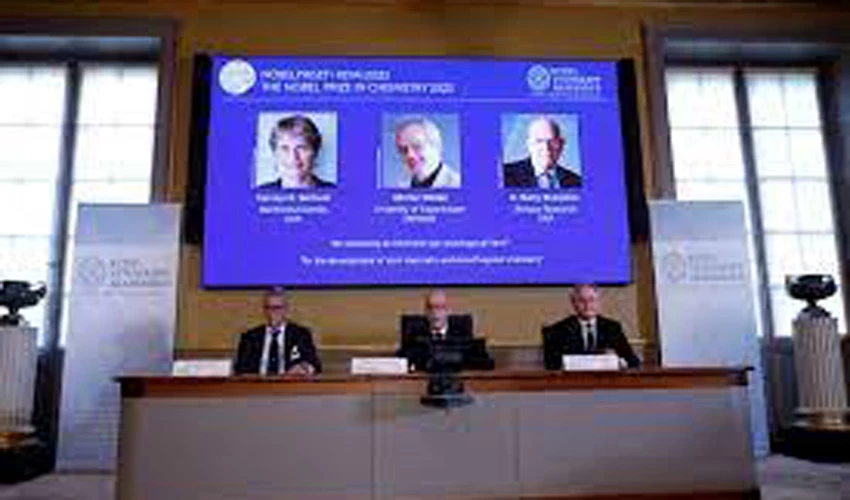US duo and Dane win Nobel Prize for 'click chemistry'

STOCKHOLM, Sweden (AFP) - A trio of scientists from the United States and Denmark won the Nobel Chemistry Prize on Wednesday for laying the foundation for a more functional form of chemistry where molecules are linked together.
Americans Carolyn Bertozzi and Barry Sharpless, together with Denmark's Morten Meldal, were honoured "for the development of click chemistry and bioorthogonal chemistry", the jury said.
Bertozzi is the only woman among the seven Nobel laureates honoured so far this year, with women vastly under-represented in the history of the prizes, especially in the science disciplines.
The chemist -- who as an undergraduate at Harvard played keyboards in a band called Bored of Education with future Rage Against the Machine guitarist Tom Morello -- is only the eighth woman to win a Nobel Chemistry Prize, out of 189 recipients.
Speaking to AFP, Bertozzi conceded she didn't have the musical talent of her former bandmate.
"So I think I chose the right path. Especially today," she said.
Benjamin Schumann, a chemist as London's Imperial College and former student in Bertozzi's lab, however said she was still known as "the rock star of sciences".
The award marks the second Nobel for 81-year-old Sharpless, who won in chemistry in 2001.
Only four other individuals have achieved the feat of winning two Nobel Prizes, including Polish-born Frenchwoman Marie Curie, who won the chemistry prize in 1911 after first winning the physics prize in 1903.
Like Lego
Click chemistry "is an elegant and efficient chemical reaction that is now in widespread use," the jury said in a statement.
"Among many other uses, it is utilised in the development of pharmaceuticals,for mapping DNA and creating materials that are more fit for purpose," it added.
Sharpless, a professor at Scripps Research in California, "started the ball rolling" and "coined the concept of click chemistry" around 2000, the jury said.
Afterwards, Sharpless and Meldal, a professor at the University of Copenhagen, independently of each other, presented "what is now the crown jewel of click chemistry: the copper catalysed azide-alkyne cycloaddition".
The process allows chemists to "snap" molecules together "with the help of some copper ions", which among other things allow for the production of new materials.
It is possible to click in substances that conduct electricity, capture sunlight, are antibacterial, protect from ultraviolet radiation or have other desirable properties, it said.
"The discovery that we did was more or less by serendipity" Meldal told AFP, calling his win a "big surprise".
Speaking to reporters, the Danish professor said the application of click chemistry could be likened to Lego -- the iconic plastic blocks that also hail from Denmark.
"You can make a house or bike or car or whatever functionality you want. By combining differently these building blocks... in chemistry, we do the same thing," Meldal explained.
'A new level'
Bertozzi, 55, a professor at Stanford in the United States, was highlighted for then taking "click chemistry to a new level".
"She developed click reactions that work inside living organisms. Her bioorthogonal reactions take place without disrupting the normal chemistry of the cell," the jury said.
Her research is now being used to investigate how these reactions can be used to diagnose and treat cancer.
"I'm absolutely stunned, I'm sitting here and I can hardly breathe," Bertozzi told reporters via telephone, minutes after the announcement.
Silvia Diez-Gonzalez, a chemist who works on click chemistry at Imperial College, London, welcomed the win.
"Thank goodness" that the days of women not being allowed in chemistry labs are over, she told AFP, though "there is a lot of bias still out there".
"I want to believe that it's just a matter of time that as women and non-white people get more opportunities to achieve their potential, then eventually the recognition they get will be spread more widely."
The Royal Swedish Academy of Sciences, which awards the Nobels in the science disciplines, has refused to introduce quotas despite the dearth of women laureates.
Goran Hansson, then-secretary general of the academy, told AFP last year after all of the science nods went to men, that it wanted every laureate to be accepted "because they made the most important discovery, and not because of gender or ethnicity".
The lack of women laureates "reflects the unfair conditions in society, particularly in years past but still existing", he acknowledged.







